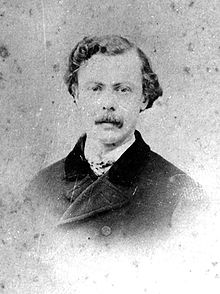Henry Hotze
| Henry Hotze | |
|---|---|
 |
|
| Born | September 2, 1833 Zug, Switzerland |
| Died |
April 19, 1887 (aged 53) Zug, Switzerland |
| Nationality | Swiss-American |
| Known for | Unofficial Diplomatic Agent of the Confederate States of America |
| Spouse(s) | Ruby Senac |
| Parents |
|
Henry Hotze (September 2, 1833 – April 19, 1887) was a Swiss American propagandist for the Confederate States of America during the American Civil War. He acted as a Confederate agent in Great Britain, attempting to build support for the Southern cause there. Hotze mobilized European public opinion to a certain degree. His success was based on using liberal arguments of self-determination in favor of national independence, echoing the failed European revolutions of 1848. He also promised that the Confederacy would be a low-tariff nation in contrast to the high-tariff United States, and he emphasized the tragic consequences of cotton shortages for the industrial workers in Britain, as caused by the Union blockade of Southern ports.
He was the son of Rudolph Hotze, a captain in the French Royal Service, and Sophie Esslinger. He was educated in a Jesuit setting and emigrated to the United States in his youth. He became a naturalized citizen in 1855, and lived in Mobile, Alabama, where he made important connections through his social skills and intelligence. He had strong racial opinions. In 1856 Hotze was hired by Josiah C. Nott to translate Joseph Arthur Comte de Gobineau's An Essay on the Inequality of the Human Races entitled The Moral and Intellectual Diversity of Races.
In 1858, he went to the southern commercial convention as a delegate for Mobile. He was a secretary for the U.S. legation in Brussels in 1858 and 1859, and when he returned, worked as an associate editor of the Mobile Register, owned by John Forsyth.
He joined the Mobile Cadets when the Civil War began. On May 30, 1861, he became a clerk in Richmond to the adjutant general. Secretary of War L. P. Walker ordered Hotze to go to London to assist in providing funds for Confederate agents in Europe, and help with the acquisition of munitions and supplies for the conflict. He went through the North and Canada before his departure, and collected some intelligence on the Union's mobilization efforts.
...
Wikipedia
